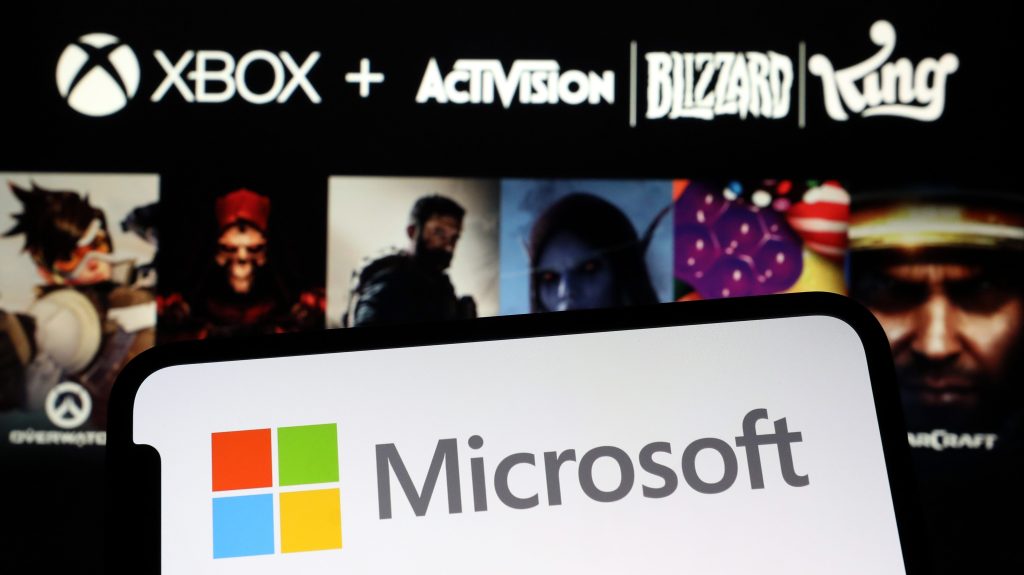Seven months after the U.K.’s Competition and Markets Authority (CMA) confirmed it was launching an antitrust investigation into Microsoft’s $68.7 billion bid for video game giant Activision Blizzard, the regulator has provisionally concluded that the merger “could harm U.K. gamers” through higher prices, fewer choices, or less innovation.
Microsoft first revealed plans for its mega-bucks Activision acquisition last January, a deal that would make Microsoft the third-biggest gaming company in the world by revenue behind Tencent and Sony. More importantly, it would also give Microsoft direct control over well-known franchises such as Call of Duty and World of Warcraft.
Scrutiny
The deal has garnered significant scrutiny from the get-go, with various bodies around the globe noting that Microsoft could use its clout to limit the distribution of Activision Blizzard games to rival distributors and platforms. The European Union (EU) is currently engaged in an in-depth probe and reportedly issued Microsoft a formal warning last week, while the Federal Trade Commission (FTC) in the U.S. is suing to block the deal. The U.K., meanwhile, announced its in-depth investigation back in September, noting at the time that the merger could result in a “substantial lessening of competition” in the U.K. gaming market.
Now the U.K. has pretty much cemented that hypothesis in stone, saying that if the deal was greenlighted, it may strengthen Microsoft’s cloud gaming credentials and stifle competition, leading to higher prices if Microsoft were to drive rival gaming companies out of the market.
Specifically, the CMA said that the deal could weaken Microsoft’s rivalry with Sony, which operates the competing PlayStation console. Call of Duty, for example, is presently available across Microsoft’s Xbox and Sony’s PlayStation consoles, among other platforms. World of Warcraft, meanwhile, is currently available only on PCs and Macs. In a world where Microsoft pulls the strings, things could look a lot different.
The CMA’s report said:
The evidence available to the CMA, including data on how Microsoft measures the value of customers in the ordinary course of business, currently indicates that Microsoft would find it commercially beneficial to make Activision’s games exclusive to its own consoles (or only available on PlayStation under materially worse conditions).
The CMA’s provisional findings note that this strategy, of buying gaming studios and making their content exclusive to Microsoft’s platforms, has been used by Microsoft following several previous acquisitions of games studios.
Rima Alaily, Microsoft’s corporate vice president and deputy general counsel, said that the company is committed to giving “easily enforceable solutions” that address the CMA’s competition concerns.
“Our commitment to grant long term 100% equal access to Call of Duty to Sony, Nintendo, Steam and others preserves the deal’s benefits to gamers and developers and increases competition in the market,” she said.
When defining what it means by “100%,” the company clarified that it means parity across content, pricing, features, quality, and playability — but only for a 10-year period. This aligns with commitments the company recently announced regarding its competitors.
In terms of what happens next in the world of Microsoft and Activision, today’s announcement is essentially to solicit a final round of feedback from “interested parties.” This will of course include both Microsoft and Activision Blizzard, as well as competitors, which have until March 1, 2023, to respond, with the CMA sending the two companies a separate report explaining how its concerns can be addressed.
The CMA said it expects to file its final report by April 26, 2023.
In response to today’s announcement, an Activision spokesperson suggested that the CMA may not have fully understood the gaming industry, something it hopes to address in the coming months.
“We hope between now and April we will be able to help the CMA better understand our industry to ensure they can achieve their stated mandate to promote an environment where people can be confident they are getting great choices and fair deals, where competitive, fair-dealing business can innovate and thrive, and where the whole U.K. economy can grow productively and sustainably,” the spokesperson said.
Precedent
The U.K.’s antitrust authority has raised a number of cases against “Big Tech” M&A activity in recent times, perhaps most notably against Facebook parent company Meta, which was ordered to sell GIF platform Giphy. Facebook had acquired Giphy for $400 million back in 2020, but the CMA asserted that the deal would limit choice for U.K.-based social media users and reduce innovation in display advertising. Despite much protestation, Meta later agreed to divest Giphy.
Microsoft’s multi-billion-dollar Activision pursuit is an entirely different proposition, of course, so it’s difficult to know at this juncture what Microsoft and Activision will do if they can’t make the CMA reverse course. But it’s also worth noting that there are multiple regulators looking closely at this transaction, and they may be comparing notes — so today’s verdict could be a sign of what’s to come elsewhere in Europe and the U.S.
“The CMA’s decision, whilst provisional, is notable in that it suggests structural commitments — e.g. divestiture — may be the only way for the merging parties to allay its competition concerns,” said Alex Haffner, competition partner at London-based law firm Fladgate. “This would obviously call into question the strategic rationale for the deal. It is also important because the CMA is one of several regulators considering the transaction, and those regulators will undoubtedly be in close contact with and sharing their competitive assessments with one another.
“It is clear therefore that Microsoft faces a stiff challenge to get the global regulatory green light for the transaction on terms which it will be able to live with commercially.”































Comment